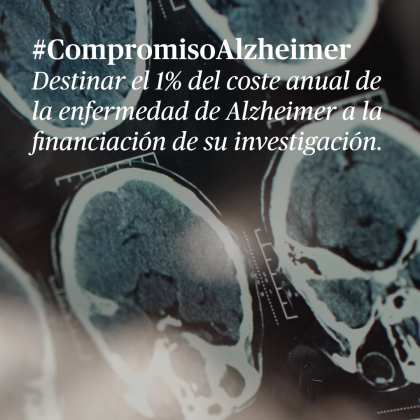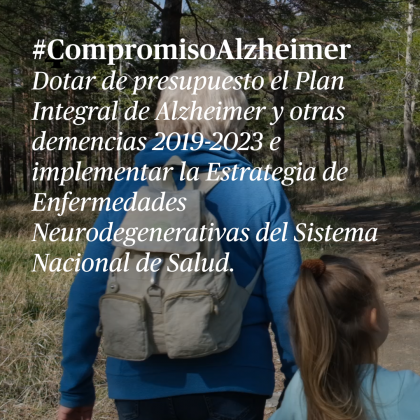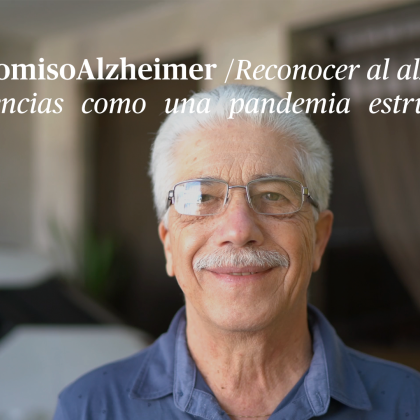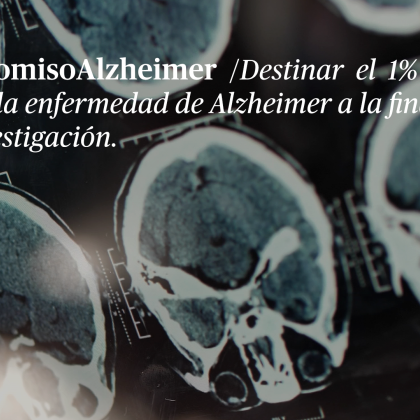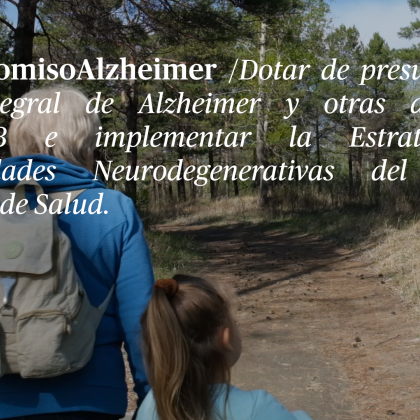• Twelve leading organisations in the field of Alzheimer's and the elderly join forces to make this disease a priority and to make every effort to find a definitive solution.
• #CommitmentAlzheimer's calls for Alzheimer's disease and dementias to be a political priority, for specific funding to be earmarked for research and for the implementation of the Comprehensive Alzheimer's Plan.
• In addition, the organisations are committed to raising awareness of the impact of Alzheimer's and raising the social status of sufferers and their carers.
• Alzheimer's disease and dementias already affect more than one million people in Spain.
Barcelona, 11 May 2022 - Leading organisations in Spain working in the field of Alzheimer's and older people have joined together in the manifesto "Commitment to a future without Alzheimer's" to make the fight against this disease a priority in public policies and to make the necessary efforts to have the tools to prevent and cure this pathology. "Recent experience has shown us that scientific knowledge is essential to find solutions, but dementias have been and still are neglected diseases in the budgets allocated to the promotion of research," the document states.
Through #CompromisoAlzheimer, the signatories ¬¬-65yMás, ACE Alzheimer Center, Alzheimer España, CEAFA, Fundación CITA Alzheimer, Fundación Cien, Fundación Pasqual Maragall, Fundación Pilares, HelpAge, Matia Fundazioa, Mayores UDP and the Spanish Society of Neurology ¬¬- undertake to disseminate the impact of Alzheimer's disease and dementias, work to place them among the political priorities and raise the social consideration of those affected and carers. At the same time, they call for decisive and urgent action to achieve a future without this disease. "The time has come to tackle Alzheimer's", they state in the document.
A pandemic that needs to be a political priority
The main demands made to the public administrations by the signatories of the Commitment to a future without Alzheimer's are as follows:
- Recognise Alzheimer's disease and dementias as a structural pandemic that will lead to the collapse of health and care systems, with an unbearable economic and social cost, if solutions are not developed to combat them.
- Place these pathologies among the top priorities of science and innovation, health, social and economic policies, including them specifically and with a budget allocation in the initiatives being developed in these areas.
- Earmark the equivalent of 1% of the annual cost of Alzheimer's disease to fund research into it and to promote the transfer of knowledge for its practical application.
- Review, budget and urgently implement the policies contained in the Comprehensive Plan for Alzheimer's and other dementias 2019-2023 and deploy the National Health System Strategy for Neurodegenerative Diseases.
With this manifesto, the signatory organisations remind us that Alzheimer's and dementias can only be stopped "with the commitment of society as a whole and with the leadership of public administrations, which must act decisively and urgently".
More than one million people affected in Spain
Alzheimer's and dementias are currently one of the main causes of mortality, disability and dependence1. In Spain alone, it is estimated that they affect around 1.2 million people2 , one in 10 people over the age of 65 and a third of those over the age of 853, a figure that exceeds 4.8 million people when considering the family as an involved party. Its costs reach 60 million euros per day in our country4 , 87% of which are borne by the families themselves5. In addition, alongside the people affected, there are carers, who make up a reality that is not very visible and does not receive the attention it needs.
"In a few years, the economic and social costs will be unbearable, both for families and for the health and care system, which is why Alzheimer's is one of the diseases that most concerns Spaniards of all ages," says the manifesto, which also warns of an exponential increase in the disease worldwide. "With life expectancy on the rise, if no effective treatment is found to modify its course, the number of cases could triple worldwide by 2050," they say.
The demands set out in the Commitment to a future without Alzheimer's are part of the Decade of Healthy Ageing 2021-2030 declared by the World Health Organization (WHO) with the aim of promoting concerted action to improve the quality of life of older people. "We need to invest resources and efforts in averting the devastating consequences of the Alzheimer's pandemic on the economy, society and the well-being of families around the world. We are living longer, but we must aspire to live better.
1 Leading causes of death and disability worldwide. OMS (2020)
2 Data from the Spanish Alzheimer's Confederation (CEAFA)
3 Alzheimer’s Disease Facts and Figures. Alzheimer’s Association (2017)
4 Data from the Spanish Alzheimer's Confederation (CEAFA)
5 Assessing the socioeconomic impact of Alzheimer’s Disease in Western Europe and Canada. The Economist (2017)
6 Prospective one-year cost-of-illness cohort study in patiens with Dementia of Alzheimer’s disease type in Spain: the ECO study. Journal of Alzheimer’s Disease (2010)
PRESS CONTACT:
Communication Agency
ATREVIA
Albert Rimbau / Laura Puig
arimbau@atrevia.com / lpuig@atrevia.com
683 16 20 28 / 619 64 93 62
Signatory entities (in alphabetical order):



